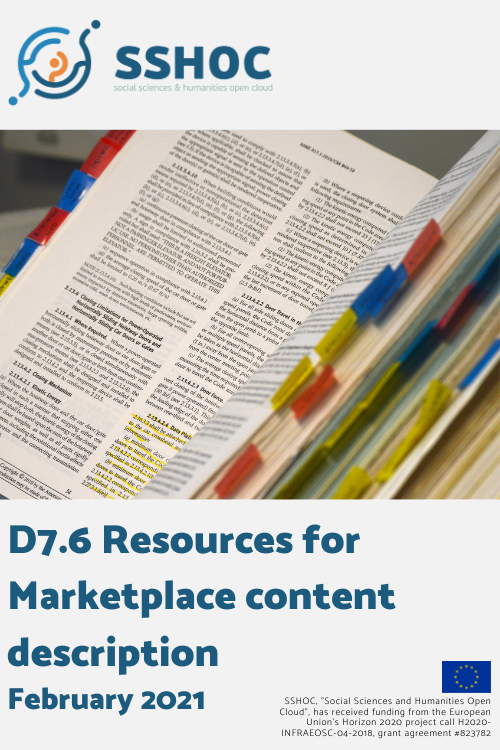
- Social Sciences & Humanities Open Cloud
D7.6 SSHOC Resources for Marketplace content description

Submission date:
15 February 2021
This document presents the results of a survey on existing vocabularies in Social Sciences and Humanities (SSH) conducted by Task (T) 7.4 of the Social Sciences and Humanities Open Cloud (SSHOC) project funded by the European Commission under Grant #823782. T7.4 is part of WP7, in charge of creating the SSH Open Marketplace: a discovery portal crafted for the SSH research community, offering contextualised solutions to diverse research enquiries (e.g., tools or services) at every step of a researcher’s data life cycle.
The main objective of this deliverable is to contribute to a better understanding of vocabularies used within SSH in order to inform SSHOC services’ development: the SSH Open Marketplace but also other initiatives suchas the work conducted by CLARIN and SSHOC T3.1 to improve the service offered by vocabulary management and publication platforms for SSHOC, and the SSHOC Reference Ontology (T4.8).
The survey presented here, distributed among SSH research communities in Europe, gathered 330 answers, with 42 of them commonly using vocabularies, embedded in their research practices.
As the conclusion shows, the SSH vocabularies landscape is still very heterogeneous: the vocabularies used are often very specialised or discipline-oriented, which limits their potential for reuse over the SSH community at large and does not make them very suitable for the generic description needed in a discovery portal such as the SSH Open Marketplace.
This deliverable and the survey also illustrate the diversity of understanding that lies behind the term “vocabulary”. Collecting and showcasing the semantic artefacts in the SSH Open Marketplace - be they controlled vocabularies, dictionaries and thesauri to metadata schemas, and ontologies - would be a contribution towards addressing the challenges that are raised by this vocabulary topic in SSH. Alongside the CLARIN and T3.1 initiative to identify a suitable vocabulary platform for editing and publishing SSH vocabularies, and the different tasks working to further develop semantic artefacts for their communities, this could be seen as a significant SSHOC contribution.
Publication type:
Deliverable
